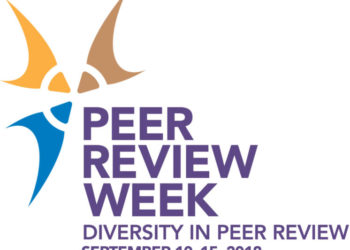Editor’s Note: Today’s guest post is by Susan Spilka, who is winding down a long career working with publishers, societies, and technology services. She is a co-founder of the Workplace Equity Project and co-author of Evaluating Equity in Scholarly Publishing, which mapped bias across the global scholarly publishing industry in 2018.
So much has happened since the 2018 Workplace Equity Survey (WE Survey) was conducted to assess the state of diversity, equity, inclusion, and accessibility (DEIA) in scholarly publishing workplaces. Five years later, as the world struggles with the fallout of the global pandemic, war, political unrest, and economic instability, what is happening in scholarly communications workplaces? Is DEIA still a priority, or are we seeing organizations take a step back? We hope you’ll share your thoughts and experiences in the 2023 WE Survey.

Setting the Baseline
The 2018 WE Survey was an important milestone in growing momentum to transform our industry. Nearly 1,200 individuals working in scholarly publishing organizations and consultancies shared their personal workplace experiences concerning work–life balance, career breaks, career satisfaction, professional development, mentoring, networking, and attitudes and behaviors. The analysis of their collective perceptions broadened our understanding of diversity, equity, and inclusion in our industry. Among the key findings, the WE Survey showed that:
- Senior leaders in scholarly publishing were more likely to be older, White males with master’s degrees. The chances of attaining a senior position in scholarly publishing were higher for White males with no tertiary-level qualifications than for Black females with postgraduate degrees.
- Most demographic groups (with the exception of the Black cohort) recognized their own challenges but were blind to the bias experienced by other groups.
- Respondents revealed that their own experiences were defined more by the attitudes of their line managers, than by organizational policies and programs.
In addition to these (and other) statistically significant insights, hundreds of people spoke their minds safely and anonymously, providing much-needed feedback on their lived experiences or working in scholarly publishing. Here are a few of their comments:
This industry needs a real shift toward inclusivity. Every person of color I know has a foot out the door at all times because they are unsatisfied and feel excluded and mistreated. If I didn’t love the actual work, I would have left years ago. (Female, multiple races)
Implicit bias is real and very much affects career opportunities and progression, speaking from personal experience. I think this is an unacknowledged part of why publishing is suffering from a lack of diversity. All too often, women who champion women’s progression in the workforce, do not appreciate or care, or perhaps feel threatened by, supporting people of color and other ethnic and religious backgrounds. (Female, Black)
I am the only black/mixed‐black person in my office of nearly 100 people and I don’t believe there has ever been more than one other person of a black/mixed‐black background in the entirety of the years I’ve worked here. There is also something of a class bias. Most of my office is upper middle class white. (Female, Multiple races)
Workplace equity was never more visible than it is today: yet, sadly, stereotypes persist, attitudes remain callous, and the onus remains on the woman to stand buff and succeed in spite of everything. The discussion of change is much louder than actual change. (Female, Asian)
I just don’t see women and certain minority groups getting the same opportunities even though the company policy states that they should. Age is a strange one. I think that one’s age can affect a hiring manager’s [decision] depending on the job opening. It’s very difficult to break apart age and experience but age definitely affects career opportunities in positive and negative ways. (Male, Multiple races)
Assessing Impact
The publication of the WE Survey findings and data revealed a highly inequitable workforce that did not reflect the demographic composition of the general population or consistently embrace a diversity of perspectives and contributions. It identified and quantified the structural biases and barriers that hold back so many people in our industry. This heightened awareness was magnified by subsequent world events, prompting many individuals and organizations to begin to do the hard work of acknowledgement, accountability, and remediation.
Some of that work is evident in recent literature. The research article based on the WE Survey responses, Evaluating Equity in Scholarly Publishing in Learned Publishing, established important benchmarks that have been cited by researchers in our industry and beyond, with 2,205 views and 242 downloads of the survey data in the Open IPCSR repository. In addition, Nancy Roberts identifies areas for more research and the risk of not taking action in her [2021 review] of recently published data on diversity and inclusion in the UK and North America. Under C4DISC’s sponsorship, four Toolkits for Equity have been published (with more to come), providing much-needed resources to help transform workplaces to become more diverse, inclusive, equitable, and accessible. Niamh O’Connor’s 2021 paper on publishing during the pandemic is a call to action for fundamental change with regard to the importance of community; racism, bias, and structural inequities; and openness, transparency, and trust. Rebecca Kirk, Susan Harris, and Chhavi Chauhan’s 2023 study documented challenges and opportunities for more equitable representation in scholarly publishing industry awards. And there are many other examples of the work being done to improve DEIA in our industry.
Next Steps
But what, if any, real progress has been made? To help determine this, C4DISC, a coalition of organizations in scholarly publishing and academia, is running a follow-up survey. The 2023 WE Survey launches at the SSP Annual Meeting. Under the leadership of co-chairs Simone Taylor and Chhavi Chauhan, the 2023 WE Survey will evaluate progress against the industry benchmarks we established in 2018, to assess how societal change since then 2018 has influenced workplace practice and experience. For the first time, the scholarly publishing industry will be able to identify longitudinal changes in diversity, equity, inclusion, and accessibility.
We can speculate on what the 2023 survey will find. I would expect to see some progress, to be sure, but also more of the same old, same old. The Vital Signs survey, a pared- down version of the WE Survey conducted by TBI Communications in 2021, picked up on some optimism, but my recent conversations make me think that it is dissipating. Anticipating this outcome brings to mind Scholarly Kitchen Chef Dianndra Roberts’ February 2023 post, “What have you done for DEIA lately?”. Despite recent achievements, she acknowledged that continuing challenges cause many to feel exhausted and frustrated:
Change does not come at the first step, and you cannot stop at the first hurdle or the second or the third. We all have to keep going and do the work. For those of us who are marginalized and continually doing the work to change an environment, a system, an industry that does not always feel welcoming to us, it can be exhausting. I have personally burned out from this in the past, so please protect your peace, rest when you need to and know that what you are doing matters and is valued.
However, as I write, a couple of notifications with heartening news have popped up on my desktop. For example, Goldman Sachs is to pay $215m in a sex discrimination case that has been around since 2010; finally there is a victory. Not to mention the jury verdict in favor of E. Jean Carroll in her defamation suit against Donald Trump. These stories remind me that change is slow and non-linear, and importantly, that each of us has the power to help make it happen. As Margaret Mead said, “Never doubt that a small group of thoughtful, committed, citizens can change the world. Indeed, it is the only thing that ever has.”
One way we can all make a difference is by participating in/promoting the 2023 WE Survey in 2023. We invite you to complete the survey. This time around, we hope to hear from even more voices than we did in 2018 – so let’s do this!
Discussion
1 Thought on "Guest Post — Workplace Equity 2023 Versus 2018: Reckoning or Retrenchment?"
LINK TO SURVEY: https://www.surveymonkey.com/r/workplace-equity



